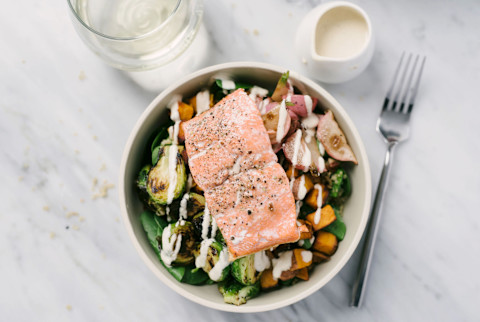Eating More Of This Food May Lower Depression Risk In Women By 62%

The Mediterranean diet, celebrated for its longevity perks and user-friendly guidelines, keeps racking up accolades. So when we came across a study showing yet another benefit of following it, we weren't necessarily surprised. However, what's interesting about this research is that it digs into the specific foods that could be driving most of the diet's effects.
Here's what to know about research on how following a Mediterranean diet could support your mental well-being—and which foods, in particular, to prioritize.
The Mediterranean diet may lower depression risk in older women
For this study1 published in the British Journal of Nutrition, researchers asked 798 (325 men and 473 women) participants between the ages of 64 and 97 to complete a food questionnaire. This helped them determine who followed the Mediterranean diet (high in vegetables, fruits, nuts, whole grains, fish, and healthy fats and low in sweets and processed foods) the most closely.
In the end, those who had a higher adherence to the Mediterranean diet were 54.6% less likely to have depression symptoms. When analyzing the data by gender, the researchers found that the association was particularly strong in women. In addition, women who followed a seafood-heavy version of the diet (eating three or more servings of fish a week) had a 62% lower risk of depression.
Researchers have a few guesses about why a seafood-heavy Mediterranean diet might be associated with reduced depression risk in women: For starters, fatty fish are high in omega-3 fatty acids that are closely linked to mental health2. Their ratio of monounsaturated fats to saturated fats may also support a healthy inflammatory response3 in the body, which can pay off for your brain and mood.
The study found that men who ate more nuts and fruits also had an 82% reduction in depressive symptoms, highlighting the potential mental health benefits of a diet high in unprocessed plant foods, regardless of sex.
As nutritional psychiatrist Uma Naidoo, M.D., previously wrote on mindbodygreen, "Inflammation in the gut loops back to the brain, potentially leading to neurocognitive decline. Consuming fiber-rich foods like fruits and vegetables, especially of different colors (which provide a diverse set of vitamins, polyphenols, and flavonoids) can be a great way to keep your brain sharp as you grow older... Colorful veggies also contain phytonutrients and fiber and positively interact with gut microbes, which reduce inflammation in the body when we feed and nourish them well."
However, the study doesn't explain the reasons behind the sex-based differences in results, indicating a need for further gender-specific research.
This study joins a growing body of research showing that healthy fats, specifically omega-3 fatty acids, are beneficial for whole-body health.
In addition to supporting mood, omega-3s have been shown to support memory, joint comfort4, vision, heart health5, and even more areas of concern that become increasingly important with age.
While some cultures are well-accustomed to daily seafood, studies show Americans tend to under-consume fish. So, take this as a reminder to source some of your proteins from the sea every once in a while. To ensure your catch is sustainable, opt for small, fatty "SMASH" fish (salmon, mackerel, anchovies, sardines, and herring) when possible.
You can also level up your brain health routine by taking a daily omega-3 supplement. Research shows that supplementing with omega-3s can also boost cardiovascular health, vision, joint health, and more.* Here's a curated list of the most potent omega-3 supplements if you're on the hunt.
The takeaway
Research suggests that high adherence to the Mediterranean diet could mitigate depression risk in women, thanks to the increased omega-3 fatty acid consumption. For a deeper dive into what the Mediterranean diet entails and some meal inspiration, check out this guide.
